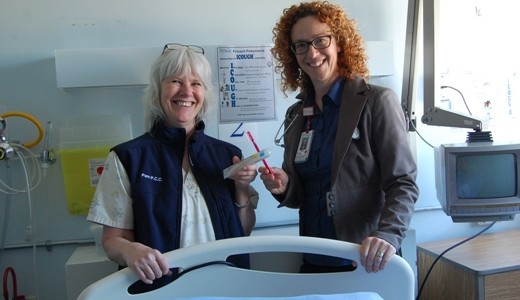New ICOUGH Strategy reduces pneumonia by 39 %
Sometimes it’s the little things that can make a big difference.
The ICOUGH Strategy is a simple 6-step process that has been implemented across Richmond Hospital to help post-operative patients reduce the chances of contracting pneumonia. It’s quick, doesn’t require any special equipment and costs less than $2 (for a toothbrush and toothpaste, if patients don’t bring their own from home)
It all began after NSQIP data showed higher than anticipated rates at Richmond Hospital in 2012/2013. Elan Nattrass, Professional Practice Leader of Respiratory Services, was asked to develop a strategy.
Elan did extensive research and found that Boston Medical Centre had developed a successful system. Their system however, was somewhat complex, involved an incentive spirometry machine, and was not appropriate for our diverse patient population. She modified their system and came up with a strategy good for all RH patients. Key aspects of our approach are: taking deep breaths in and briefly holding them, clearing the lungs with coughing, practicing good oral health, and engaging the patient and family in the process. Our plan helps patients stay healthy after surgery and – this being healthcare – there is an acronym to help people remember it.
ICOUGH stands for:
I – In. Breathe In and Hold. Take a big breath and hold it for 3 seconds every 30 minutes. This opens up the lungs.
C – Coughing. Deep breathing and coughing. This cleans the lungs.
O – Oral care. Brush your teeth 3 times a day . . . morning, noon and night. A clean mouth is safer.
U – Up. Having the head of the bed up helps expand the lungs and prevents saliva from going down the wrong way.
G – Get moving. Movement is good for you and helps speed recovery.
H – Have a conversation with the patient. It’s important that they are engaged and active in their recovery.
Staff encourages patients to practice the ICOUGH strategy as often as possible but at least three time a day.
The strategy was rolled out across the hospital through a campaign of discussions at team huddles and posters at each patient’s bed side.
“Care givers are thrilled with the ease, simplicity and effectiveness of the strategy,” says Elan.”In fact, it’s been so successful that I’ve been invited to a number of regional discussions and Vancouver General Hospital is incorporating components of the strategy into theirs. I’ve presented our success at the BC Patient Quality and Safety Forum, and will be going to NYC in July to the NSQIP conference”
“Thanks to everyone for making this such a success. Thanks to Shannon Long, Librarian, for your invaluable assistance with the literature search, the VCH NSQIP team, but most importantly the frontline nurses and clinicians for making ICOUGH part of their daily work.
Elan says that although her heart is in direct patient care, she’s also becoming a bit of a data nerd because of its ability to identify gaps or strengths that are really impacting the quality of care provided, and its power in facilitating effective change.

